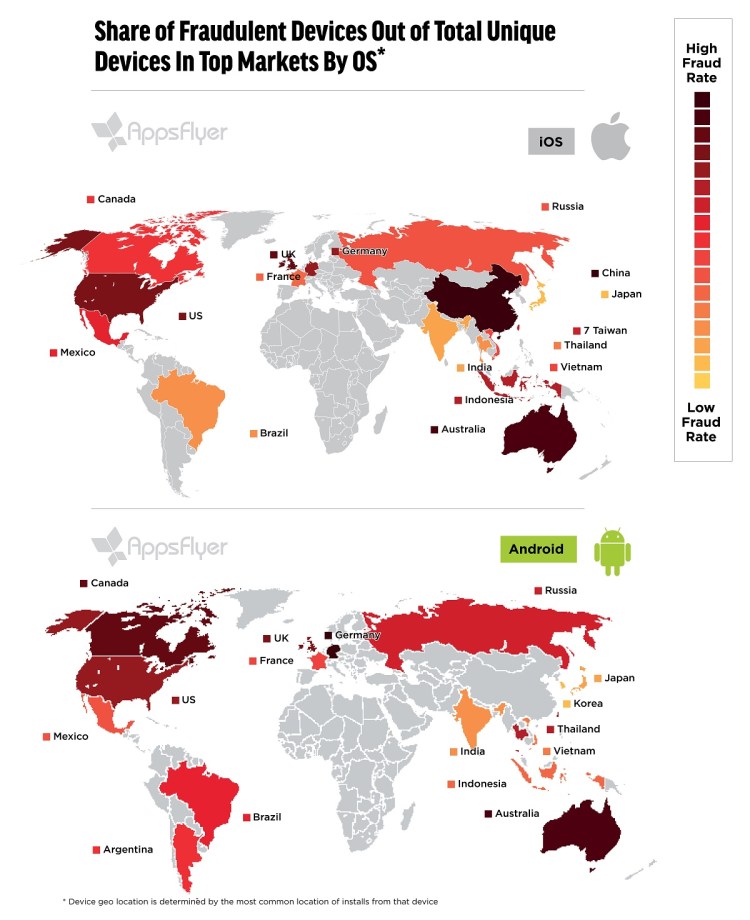Mobile app marketers will lose up to $100 million this year due to app install and engagement advertising fraud.
San Francisco-based mobile attributing and marketing analytics firm AppsFlyer said in a report that its data shows the U.S. is targeted the most by fraudsters. After the U.S, the countries with the highest rates of fraud (factoring for mobile population) include Germany, Australia, China, Canada, and the United Kingdom.
To deal with this problem, AppsFlyer is introducing a mobile device-level fraud prevention technology with three to 12 times better protection than existing industry solutions, the company said.
The study’s findings are based on the company’s new anti-fraud technology, called DeviceRank, which also launched today. The technology provides a new level of protection for mobile app advertisers by automatically “cleaning” fraudulent devices from marketers’ campaigns aimed at driving app installs and post-install activities.
The research shows that fraudsters attempt to target specific countries based on the potential payout they can get. Countries with the highest cost-per-install and cost-per-action payouts have a higher fraud rate, while regions with relatively low payouts — including Indonesia, India, Brazil, Vietnam, and Thailand have a lower rate of fraud.
Further, while roughly 50 percent more fraud is perpetrated on Android, iOS is not immune and is often heavily targeted, since successful payouts tend to be far higher on iOS than Android for those perpetuating app install and engagement fraud.
With marketers increasing spending budgets and putting more efforts behind mobile app install and engagement campaigns to attract loyal users, the threat of mobile app install and engagement fraud continues to grow. Most install fraud solutions rely on Internet Protocol filtering and data modeling at the user or app level, but DeviceRank is the first fraud solution in the industry to identify and address fraudulent app installs and engagement at the device level, AppsFlyer said.
AppsFlyer’s DeviceRank technology works similarly to a Credit Score, identifying questionable behavior and offering enhanced protection. It leverages a proprietary big data-powered algorithm to build an anonymized, multidimensional rating of every mobile device. Each device is rated on a scale from C (fraudulent), to B, A, AA, and AAA.
Devices with a “C” rating are automatically excluded from AppsFlyer’s attributed installs and analytics. More than 1.4 trillion mobile interactions have been cataloged in the company’s database over the past five years, and 98 percent of all mobile devices across the globe are already rated, AppsFlyer said.
“As we’ve seen from our global study, fraudsters and scammers are growing increasingly sophisticated, tricking advertisers into paying for both installs and in-app engagement,” said Oren Kaniel, cofounder and CEO of AppsFlyer, in a statement. “DeviceRank takes a radically different approach, cutting off fraud at the source and adding transparency to our industry in order to protect advertisers, our partners, and the entire market. AppsFlyer is in a unique position to apply this game-changing technology and leverage our scale across the mobile industry, arming marketers worldwide with the best solution to combat mobile app install and engagement fraud. We are excited to add DeviceRank to the AppsFlyer Active Fraud Suite, as we remain committed to fighting fraud and helping cleanse the app ecosystem of this problem.”
According to the new study, the $100 million cost to marketers in 2016 stems from fraudulent click data, paid installs from fraudulent devices, fraudulent and simulated in-app events (CPA fraud), and the projected impact of these false installs and events on lookalike targeting and retargeting.

Above: AppsFlyer checks devices for fraud.
VentureBeat's mission is to be a digital town square for technical decision-makers to gain knowledge about transformative enterprise technology and transact. Learn More

